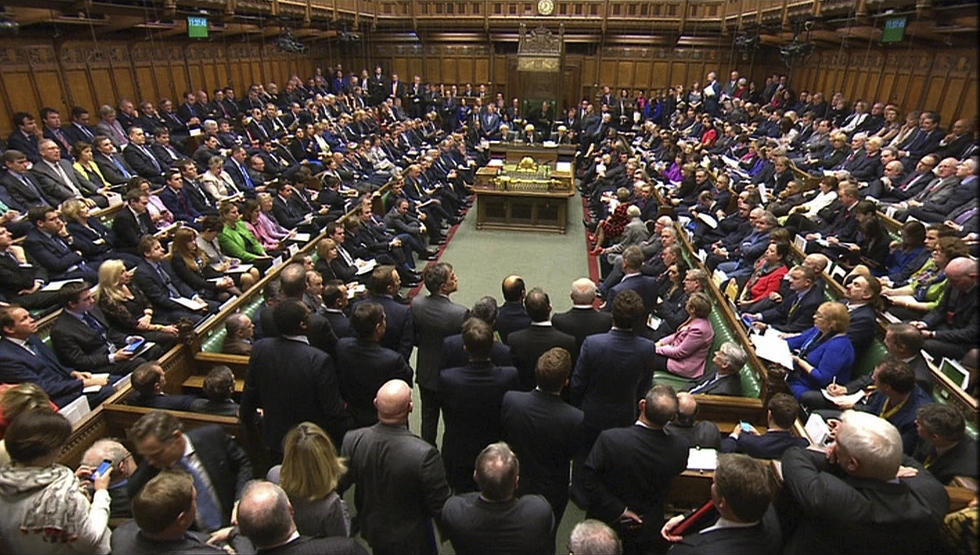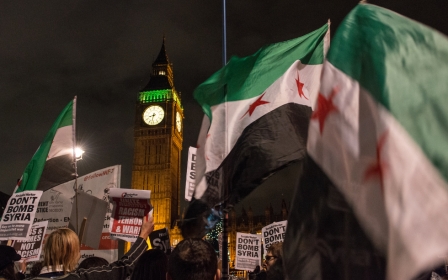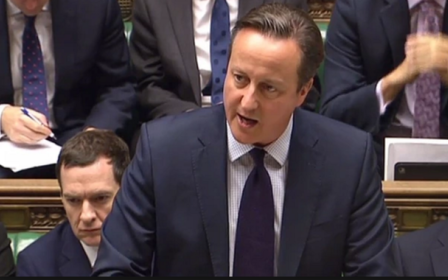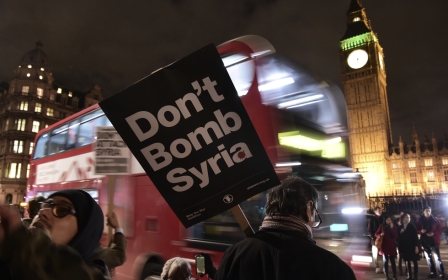10 reasons why UK airstrikes in Syria will achieve nothing

After 397 MPs voted in support of airstrikes in Syria on Wednesday, British Tornado jets launched a first wave of bombing raids overnight on IS targets in Syria.
Commenting on the parliamentary vote itself, observers have noted how the emotional aftermath from the Paris attacks appears to have derailed reasoned debate in the Commons.
Here are 10 reasons why I think UK airstrikes in Syria is the incorrect strategy to embrace.
1 British airstrikes in Syria add nothing significant to the ongoing bombing campaign by the US-led coalition and Russia. At the Commons, many MPs emphasised the need to “support our allies”, namely France and the US. However, Britain jumping on the anti-IS bandwagon to demonstrate that it’s still a global policeman, under the banner of “standing shoulder-to-shoulder” with its allies, is rather disingenuous.
2 MPs who voted against the air strikes questioned British Prime Minister David Cameron’s “phantom army” of 70,000 opposition fighters that will fight IS in coordination with the air strikes. It’s important to highlight that currently there are 81 rebel factions fighting the Assad regime, many who would be regarded as “Islamist extremists” by the same MPs that voted for the airstrikes. With this in mind, which rebel faction is Cameron referring to? The Free Syrian Army (FSA) who are being bombed by Russia, whilst allying themselves with Jabhat al-Nusrah in resisting IS? Or is he alluding to the Kurdish Peshmerga and the YPG, who are fighting IS and Turkey, the latter being an ally of the UK and a NATO member?
3 Another legitimate question to be asked is that - based on empirical facts - does IS or the Assad regime have more blood on their hands? Without a shadow of a doubt, it is the Assad regime who has slaughtered an overwhelming majority of the 250,000 deceased Syrians. Who will these air strikes really benefit on the ground if they are successful?
4 On 4 October, Cameron argued that Russia’s bombing campaign in Syria will cause “further radicalisation and increase terrorism”. If that is the case, then one must ask whether British bombs are immune from causing radicalisation and terrorism. The same bombs that pounded Iraq in 2003, which subsequently created the vacuum that gave birth to IS, can quite plausibly do the same in Syria.
5 Britain and the US were invited to bomb IS in Iraq by the "elected government" of Prime Minister Haider al-Abadi. In contrast, who has "invited" Britain to bomb Syria? Neither Assad nor the rebels have, and regional powers that have fuelled the conflict can hardly be regarded as legitimate inviters.
6 Let’s say for arguments sake, that IS is “degraded and defeated”, and Cameron’s phantom army of 70,000 take Al-Raqqa; would it be too far-fetched to assume that Assad’s forces could bomb the "moderate rebels"? If that were to happen, is Britain prepared to defend the opposition forces against Assad and the Russians?
7 Are Russia, Iran, Hezbollah and Assad now "unintended allies" of Britain on the basis of being the "lesser of two evils" to IS? If so, it should be made clear that the years of aggressive rhetoric against the so-called "Axis of Evil" by successive British governments was merely lip service.
8 According to Tory MP David Davis, Cameron’s glorification of the Brimstone missiles as a possible game changer is based on outdated intelligence reports from the Libyan intervention of 2011. If this is true, then it’s fair to say that it may not be as "effective" and "accurate" as many would like to believe.
9 Will airstrikes in Syria improve Britain’s national security and make us safer at home? Talking to the BBC, Foreign Secretary Phillip Hammond said, “Britain is safer tonight after this decision”. In reality, British airstrikes will only strengthen IS’s recruitment drive, increasing the likelihood of British Muslims joining them when they see videos and images of innocent Syrians being killed by Tornado jets.
The Iraq war was explicitly mentioned by Mohammed Siddique before the 7/7 attacks and Michael Adebolajo after the murder of Lee Rigby, as were the British airstrikes in Iraq by stated by ‘Jihadi John’, and French intervention in Syria by one of the Paris attackers. Will the government have an answer prepared if ‘home-grown’ terrorists cite the Syrian airstrikes as a motive for their crimes in the future?
10 Based on Britain’s track record in the Middle East, how successful has military intervention been in bringing peace, stability and democracy to the region? If “fighting tyranny and oppression” was a moral caveat to bombing IS, where were these principles in opposing the despotism of Egypt’s Hosni Mubarak and now President Sisi, the Gulf monarchies, Benjamin Netanyahu, Narendra Modi and Xi Jinping? The selective application of "chivalrous values" in the form of military intervention is hypocritical, and hypocrisy fuels grievances, and grievances as we all know have proven to lead to problems.
Ultimately, bombs do not end wars. The Germans tried it in World War Two with the "Blitz", and Britain responded in a similar fashion in Dresden – neither ended the war. The US-led coalition bombed Afghanistan and Iraq for a decade; today, the Taliban maintains a firm presence, and Iraq remains in turmoil.
Similarly, Assad has been bombing his own people for four years, and that has not ended the war. So on what rational premise does the UK government believe that punitive airstrikes will “degrade and defeat” IS? These are questions that have been continuously asked and repeatedly ignored.
I can only hope that the MPs who voted for airstrikes yesterday will look back at their decision in the years to come with regret, knowing that they have contributed to the death and destruction in Syria.
The so-called "war on terror" has not safeguarded British citizens at home or abroad - in fact, it’s made the entire world a far more dangerous place. If al-Qaeda and IS-type militias are born out of these air strikes, should anyone sympathise for those who created that vacuum by supporting intervention in Syria? I certainly will not.
- Dilly Hussain is the deputy editor of British Muslim news site 5Pillars. He also writes for the Huffington Post, Al Jazeera English, and contributes to the Foreign Policy Journal and Ceasefire Magazine. He regularly appears on Islam Channel, Russia Today, and BBC TV and radio discussing Middle East and North African politics, British foreign policy, Islamophobia and the war on terror. Follow him on Twitter @dillyhussain88
The views expressed in this article belong to the author and do not necessarily reflect the editorial policy of Middle East Eye.
Photo: A video grab from footage broadcast by the UK Parliament’s Parliamentary Recording Unit shows members of parliament gathered in the House of Commons in central London on 2 December, 2015 to debate and vote on a motion to join air strikes on Islamic State (IS) militant targets in Syria (AFP/PRU).
Middle East Eye propose une couverture et une analyse indépendantes et incomparables du Moyen-Orient, de l’Afrique du Nord et d’autres régions du monde. Pour en savoir plus sur la reprise de ce contenu et les frais qui s’appliquent, veuillez remplir ce formulaire [en anglais]. Pour en savoir plus sur MEE, cliquez ici [en anglais].





